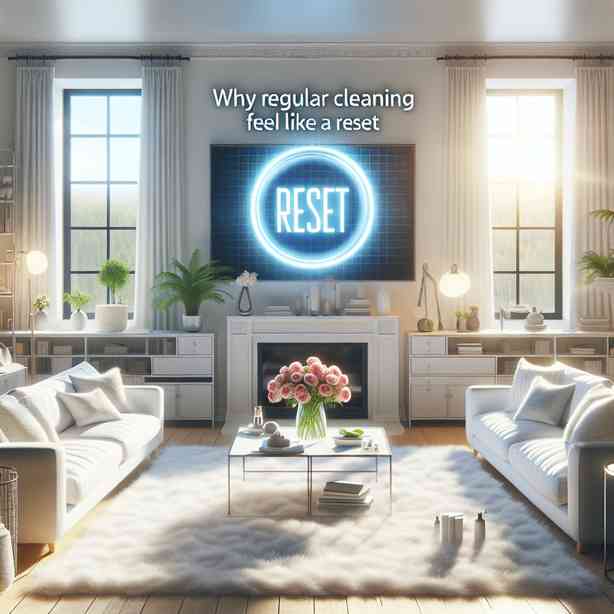
Regular cleanings feel like a reset for various reasons, both psychological and physical. When we think about cleaning, what often comes to mind is the act of tidying up our living spaces. However, the benefits of regular cleaning go beyond mere aesthetics. This article explores the multidimensional aspects of cleaning and how it triggers a sense of renewal, rejuvenation, and clarity in our lives.
Firstly, let’s delve into the psychological effects. Living in a cluttered environment can create feelings of anxiety and overwhelm. Studies have shown that an untidy space can lead to increased stress levels and a feeling of loss of control. Regular cleaning provides a structured way to combat these feelings. When we take the time to declutter and organize our spaces, we create an environment that is not only visually appealing but also mentally soothing. The act of cleaning serves as a form of mindfulness, allowing us to focus our attention on the task at hand rather than dwelling on external stressors.
Moreover, the sense of accomplishment that comes from completing a cleaning session cannot be overstated. This sensation of achievement can boost self-esteem and foster a positive outlook. Each time we tackle a cleaning task, we are essentially setting goals and reaching them. This feeling of progress can create a ripple effect, motivating us to engage in other constructive activities, leading to an overall sense of well-being. The regularity of these cleaning sessions enhances this effect; as a routine, they structure our time and create predictability in our lives.
Transitioning from the psychological to the physical, the tangible benefits of regular cleaning are undeniable. Dust, dirt, and allergens accumulate over time and can compromise the air quality in our homes. Regular cleaning helps mitigate these risks, resulting in a healthier living environment. For individuals with allergies or respiratory issues, maintaining a clean home is crucial. When surfaces are regularly wiped down and carpets vacuumed, it significantly reduces dust accumulation, minimizing health risks and promoting overall physical well-being.
The concept of ‘resetting’ also extends to the emotional aspect of our spaces. Over time, objects can become associated with memories or emotions, and clutter can hold onto feelings of nostalgia or guilt. Regularly cleaning and thoughtfully organizing our spaces allows us to evaluate what we truly value and wish to keep, leading to a form of emotional decluttering. As we let go of items that no longer serve us, we create room for new experiences and memories. This intentional approach to our belongings can be liberating, offering a fresh start and a sense of renewal.
Furthermore, the cleaning process can serve as an opportunity for reflection and self-care. Taking the time to clean is, in essence, making time for ourselves. It is an act of self-respect that tells us we deserve to live in a space that feels good to us. Whether it’s a simple task like making the bed or a more involved effort like deep cleaning the kitchen, each cleaning endeavor reinforces the notion that we are worthy of care and attention. This mindset can lead to improved mental health, as we nurture ourselves not only through physical cleanliness but also through self-compassion.
In addition, regular cleaning can foster stronger relationships within a household. Collaborating on cleaning tasks can promote teamwork and communication among family members or roommates. When everyone pitches in, it leads to a sense of shared responsibility and can fortify bonds. Establishing a regular cleaning routine can also reduce conflicts over chores and create a more harmonious living environment, enhancing the overall mood and interactions within the household.
Interestingly, regular cleaning can also open up our creative energies. A clear and organized space fosters clarity of thought. When surroundings are tidy, it becomes easier to focus on tasks that require creativity or critical thinking. Many artists, writers, and innovators find that a clean workspace fuels their creative processes, allowing ideas to flow more freely. Conversely, clutter can be distracting and stifle creativity, making it harder to concentrate on one’s work. By regularly cleaning our environments, we set the stage for innovation and inspiration.
Additionally, the benefits of regular cleaning extend beyond our immediate surroundings. Developing a cleaning routine can instill discipline and structure in our daily lives. The habits we cultivate in our physical environments can often translate to other areas, such as work or personal projects. Embracing regular cleaning as part of our routine can mean we become more organized, efficient, and proactive in our other responsibilities as well.
Furthermore, the cyclical nature of cleaning can enhance our appreciation for our possessions and our environment. By regularly engaging in the act of cleaning, we become more mindful of the things we own and how they fit into our lives. This awareness can lead to more thoughtful consumer habits, fostering a sense of gratitude for what we have rather than a constant yearning for more. It can shift our focus from accumulation to appreciation, allowing us to cultivate a more sustainable and fulfilling lifestyle.
In conclusion, the act of regular cleaning does indeed feel like a reset. It encompasses numerous psychological, physical, emotional, and relational benefits. From creating a soothing and healthy environment to fostering self-compassion and discipline, the practice of cleaning can significantly enhance our quality of life. As we engage in this practice, we don’t just tidy our spaces; we also rejuvenate our minds, bodies, and spirits. Embracing regular cleaning as part of our routines might just be one of the simplest yet most effective ways to bring about personal renewal and a fresh perspective on life. In nurturing our spaces, we ultimately nurture ourselves, paving the way for growth, clarity, and a more harmonious existence.


